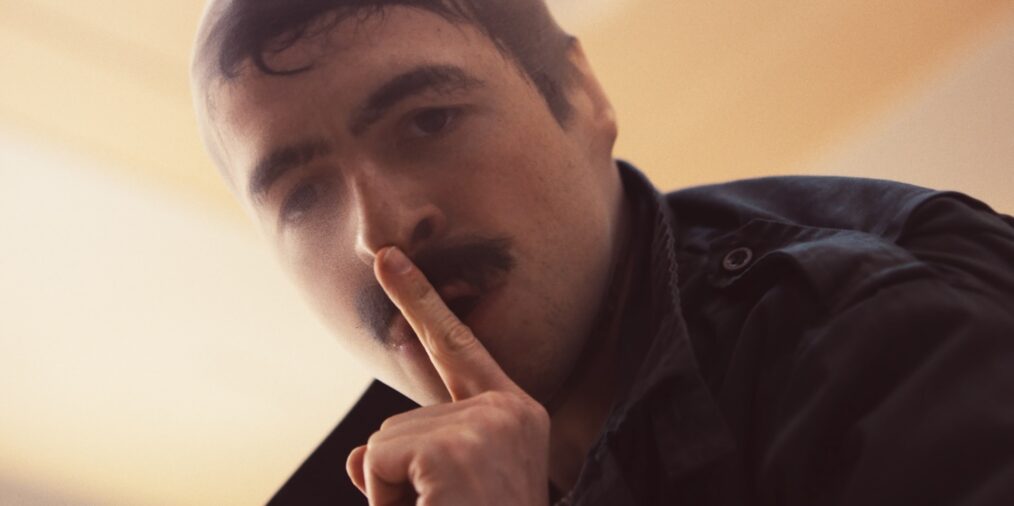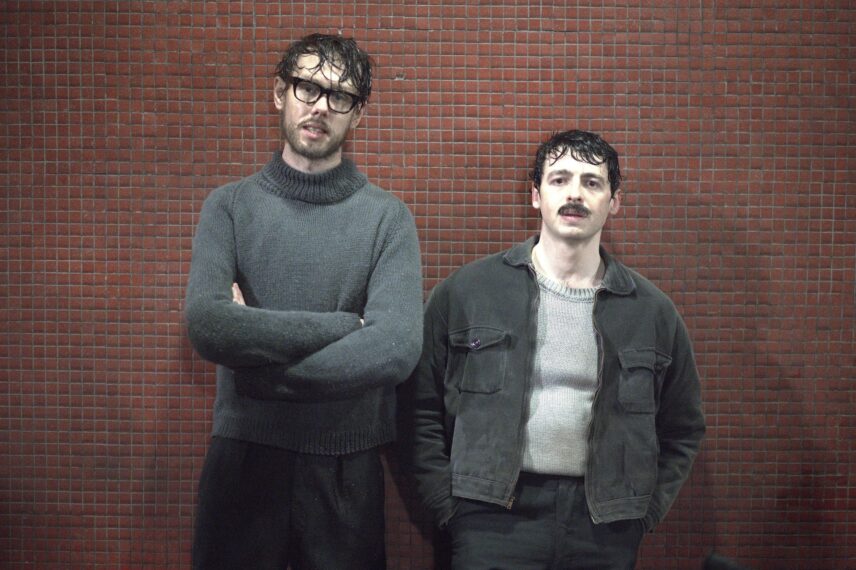Warning: The following post contains discussions of suicide.
When actor Anthony Boyle (Master of the Air, Manhunt) was growing up in West Belfast, Ireland, in the early 2000s, and attending school in the Falls Road area, he would drive past towering murals of Irish Republican Army leaders and hunger strikers like Brendan Hughes and Bobby Sands.
“I was very aware of [Hughes] as a person, and people would sing songs of him,” Boyle says, in a recent Zoom interview. The brutal history of the turbulent sectarian conflict known as Troubles seeped into his consciousness at an early age. As a raw and recent history, it was inescapable. “I grew up in a place where there are 18-foot walls running through the city separating people,” he says.
Now, Boyle is playing that IRA leader, Brendan Hughes, in a new FX series, Say Nothing, now on Hulu, that explores life in turbulent Northern Ireland during the decades-spanning paramilitary conflict. As the Irish Republican Army fights a bloody battle with British Loyalists and the British Army to reunite the country, the nine-episode series follows Hughes, fellow IRA member Delours Price (Lola Petticrew), her sister Marian (Hazel Doupe), and Irish political operator Gerry Adams (Josh Finan) from the 1970s through 90s as civil unrest and violence was unleashed in riots, car bombs, and killings. The story was inspired by interviews conducted with participants on both sides of the conflict as part of a secret oral history project of the Troubles.
Adapted from Patrick Radden Keefe’s acclaimed bestseller, this nine-episode FX series launches with the 1972 disappearance of single mother Jean McConville, who is abducted and taken from her 10 children at her Divis Flats complex home in West Belfast and shoved into a blue van, never to be seen again, a victim of the IRA’s crackdown on anyone perceived to be disloyal to the cause. The series explores the dark paths some people will travel for deeply-held beliefs, the way a deeply divided society can turn to political violence, and the psychological toll of a code of silence.

FX
When Boyle first got the call from Say Nothing executive producer and director Michael Lennox about playing Hughes, he was skeptical. “I was like, ‘No.’ Because I was like, ‘Americans writing about Ireland is one thing. Americans writing about The Troubles, it’s just going to be a [expletive] show.’ But then I read the scripts, and I was blown away by the accuracy, by the empathy, by the understanding,” he shares.
Here, Boyle discusses his personal connections to the material and his character, his newfound love for the mustache, and his upcoming role on the historical drama House of Guinness, about the beer-brewing family dynasty.
Where are you zooming from?
Anthony Boyle: I’m in Manchester [England] right now.
Are you shooting something?
Yeah, I’m filming House of Guinness, about the Guinness family in the 1860s. That’s what this mustache is about. [Strokes his mustache] It’s not a mental breakdown. We’re in the last three weeks, and then I’m going back to sunny Belfast to enjoy Christmas.
Is this mustache different than the one you grew to play Brendan Hughes?
Yeah, a different type. The Brendan tache is rough. It’s ready. It’s bushy. It’s out there. It’s machismo. He’s on the run. He doesn’t have time to look after it or trim it. Whereas Arthur Guinness’s tache, it’s very refined. He’s upper echelon. There’s a lot that goes into the tache. I’m addicted to having these mustaches, man. I just love them so much.
[Laughs] Why is that?
I feel virile. I feel like a 1860s gentleman that’s going to come off of a horse and down a pint of Guinness and slick the aftermath off my tache and slam the pint on the table and say “One more!” [Laughs] Having the tache makes me feel more confident. If you don’t know what you’re doing in a scene, just twizzle the tache, and it’s a strong look.
When Say Nothing came your way, why did you say yes to it? What pulled you in?
So I got on a call with [show creator] Josh [Zetumer] and Christopher Wallenberg, TV Insider Patrick [Radden Keefe]. And I said to them, “I think this will be good if we don’t try to answer questions, if we just ask questions. Like Disney’s not going to come in and solve [a debate about] the Troubles. When brothers have killed each other over which splinter group of the paramilitary they belong to, us making a TV show is not going to make a dent in that. What would be more interesting is if we put the audience in the driver’s seat and ask them each episode, each scene, what would you do?” Put the onus on them. If you were marching for civil rights, and then suddenly you were being beaten up by paramilitary gangs that were colluding with the police state, what would you do? Ask them, ‘What would you do in those situations? That’s the reason why I wanted to join it.

FX
What are some of those complex, difficult questions that the series raises for you about that time?
What I’ve got from when I was watching is like you have a real deep understanding and empathy towards the decisions that people are making. And it didn’t feel like “this person’s to blame” or “that person’s to blame.” It feels all very logical and emotionally sound. You can go, “Someone set off a bomb in England. Jesus Christ, why would they [expletive] do that? That’s insane.” And then once you see it from going on their journey and you see a woman who’s marching for civil rights and then being beaten and bruised, and kids being murdered on the street by the British army, you can sort of go, “I understand. I have maybe a greater empathy towards why someone would do such a thing.” I think that’s where the show is at its strongest—when it’s challenging people. When you’re actually there and you can smell the [expletive] charred bodies and these awful things are happening, you might have a different reaction.
Are you worried the series will face criticisms from all sides of the conflict?
I’m imagining people will say it’s too sympathetic to the IRA or it’s like a hit job to the IRA. I’m imagining people will say it’s pro-British army or it’s against the British army. But when you’re telling a story about something so politically fraught and emotionally fraught, where so many people lost lives, it’s complicated, and you’re never going to get it right. Brothers have murdered each other over which splinter group they belong to or which paramilitary group. I left Belfast and went to drama school and actively avoided doing anything to do with this. I avoided any role that came through that was someone who was in the IRA or had anything to do with the Troubles. But there were moments in this [show] where I thought, “Wow, this could start great conversations.” But this isn’t the definitive piece about the Troubles.
What was it like growing up in West Belfast in the time after The Troubles? What was your impression of that time before? Did it seep into your consciousness at such a young age?
I was what they called a ceasefire baby. I was born in 1994 when the [first] ceasefire happened, and then the Good Friday agreement happened four years later [in 1998-99]. And the last British soldiers left in 2007. You can remember some bits of it, some moments. But more than anything, I remember there was a suicide epidemic, like 10 young people in our community who killed themselves. And when you look at war-torn countries that have went through severe trauma and intergenerational trauma, there’s a mental health crisis where people are suffering from depression, from bipolar disorder and all kinds of [expletive]. There were friends of people I knew who killed themselves growing up or turned really badly to drugs and alcohol. And I think a lot of that is to do with the war and people being mentally and emotionally torn apart.
How did you connect with your character Brendan Hughes?
I felt connected to him immediately. It’s probably the least work I’ve had to do. I remember playing John Wilkes Booth last year [in Manhunt] and going, “I need to play a racist in 1860s,” and having to do these huge leaps of mental gymnastics. [Booth] would say crazy things like, “The Black man is enslaving the white man in America.” And you go, “How the [expletive] do I even begin to understand this and play this believably?” I didn’t really have to do that here playing Brendan because I knew so much about him and what he’s fighting for and about the things he’s saying. I felt emotionally connected to quite a lot of it. So it wasn’t a huge leap for me. The second scene I shot [on Say Nothing] was meant to [take place] in a bar called The Felons. So on my first day at work, my character is smoking, drinking, and having a craic. And then a week later, I was in Belfast at The Felons drinking and smoking and having a craic. It wasn’t a huge leap. It just felt like a smooth osmosis for me to play this role.
What do you hope people take away from the series?
I hope people have more empathy after they watch it. I think it’s just the most powerful thing in the world to see where someone else is coming from. I hope people have a better understanding for their fellow man and are less judgmental and try to understand what would make someone want to do something so drastic and then bring that into their everyday life. I think dealing in absolutes is so dangerous. I grew up in a place where there are 18-foot walls running through the city separately people. We’re constantly trying to work on a shared society and a future Ireland for everyone to cohabit and everyone to coexist.
House of Guinness sounds like a very different series from Say Nothing. What can you share about it? And what’s it been like shooting it so far?
It’s been a good craic, man. I spent most of my 20s doing English and American roles, and then I did Say Nothing, and I had the best time on it telling our story, the story of my people. And then [House of Guinness] came through and I was like, “Yeah, [expletive] it, I’m growing a mustache. I’m going back to Ireland. Let’s do it.” And I’ve had the best time. I think people are really going to like it. There’s a bit of Succession in it. There’s a bit of Peaky Blinders in it. It’s fast, it’s funny, it’s sexy, it’s cool. I can’t wait for people to see it.
Well, good luck on House of Guinness and enjoy your last days with the mustache! Or are going to keep it after you wrap filming?
No, man, I got to do some clean shaving after this. So I’m going to cut it off in three weeks and look 10 years old again.
Say Nothing, Streaming Now, Hulu
If you or anyone you know is having suicidal thoughts, please contact the National Suicide Prevention Lifeline at 1-800-273-TALK (8255) or dial 988. If you or a loved one are in immediate danger, call 911.
